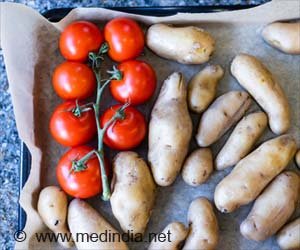Potatoes and Tomatoes may Hold the Key to Developing New Cancer Treatments

“Scientists from around the world are still searching for drugs that will be lethal to cancer cells but at the same time safe for healthy cells,” said Winkiel. “It is not easy despite the advances in medicine and the powerful development of modern treatment techniques. That is why it might be worth going back to medicinal plants that were used years ago with success in the treatment of various ailments. I believe that it is worth re-examining their properties and perhaps rediscovering their potential.”
In the past decade, tomatoes and potatoes have paved the way by proving to be highly beneficial for cancer patients.
Tomatoes, both canned and cooked, may lower the risk of prostate cancer. These products have more readily available lycopene. An observational study, on the other hand, cannot rule out the possibility of confounding by an unknown prostate cancer preventive factor (2✔ ✔Trusted Source
Tomato consumption and intake of lycopene as predictors of the incidence of prostate cancer: the Adventist Health Study-2
Go to source
).
Advertisement
According to previous research, potato extract can help cancer patients suffering from chemotherapy-induced leukopenia.These findings point to the potential role of potato extract as a protective agent in cancer chemotherapy and radiotherapy management (3✔ ✔Trusted Source
Clinical Efficacy of Potato Extract for Alleviating Chemoradiotherapy-Related Leukopenia: a Randomized, Single-Blind, Placebo-Controlled Trial.
Go to source
).Using in vitro and model animal investigations to evaluate which glycoalkaloids are safe and promising enough to test in humans is a necessary step forward. Winkiel and her colleagues highlight glycoalkaloids derived from potatoes, such as solanine and chaconine, though the levels of these in potatoes vary depending on cultivar and light and temperature conditions. Solanine inhibits metastasis and prevents some potentially carcinogenic chemicals from transforming into carcinogens in the body. Solanine kills a specific type of leukemic cell at therapeutic doses, according to research. Chaconine has anti-inflammatory properties and may be used to treat sepsis.
Meanwhile, solamargine, which is mostly found in aubergines, inhibits the reproduction of liver cancer cells. Because it targets cancer stem cells, which are thought to play a significant role in cancer drug resistance, solamargine is one of several glycoalkaloids that could be critical as a complementary treatment. Solasonine, which is found in several nightshade plants, is also thought to attack cancer stem cells via the same pathway. Even tomatoes hold promise for future medicine, with tomatine assisting the body’s regulation of the cell cycle in order to kill cancer cells.
More research is needed to determine how this in vitro potential can best be translated into practical medicine, according to Winkiel and her colleagues.
There is some evidence that high-temperature processing improves glycoalkaloid properties, and nanoparticles have recently been found to improve glycoalkaloid transmission to cancer cells, thereby increasing drug delivery. However, the mechanisms of action of glycoalkaloids must be better understood, and all potential safety concerns must be addressed before patients can benefit from cancer drugs straight from the vegetable patch.
Making Medicine from Poison
One man’s poison is another man’s medicine.
Poisonous plants and animals are widespread in nature and have been used for a great variety of purposes. With a new understanding of the complex biology of these poisonous species of plant, it is now possible to extract the right molecules that can be used as a starting point for the development of useful medicinal agents (4✔ ✔Trusted Source
One man’s poison, another man’s medicine?
Go to source
).
Since time immemorial, black nightshade (Solanum nigrum), also known as Makoi in India, has been used as a panacea for a variety of ailments (particularly liver disorders) in Southeast Asia, particularly the Indian subcontinent.
Winkiel and her colleagues concentrated on five glycoalkaloids discovered in crude extracts of the Solanaceae family of plants, also known as nightshades: solanine, chaconine, solasonine, solamargine, and tomatine. This family includes many popular food plants as well as many that are toxic, often due to alkaloids produced as a defense against animals that eat plants. The right dose, on the other hand, can turn poison into medicine: once scientists have discovered a safe therapeutic dose for alkaloids, they can be useful clinical tools.
Glycoalkaloids, in particular, have been shown to inhibit cancer cell growth and may even promote cancer cell death. These are critical target areas for cancer control and patient prognosis, and thus have enormous potential for future treatments. In silico studies, which are an important first step, indicate that the glycoalkaloids are not toxic and do not pose a risk of damaging DNA or causing future tumors, though there may be some effects on the reproductive system (5✔ ✔Trusted Source
Steroidal glycoalkaloids from Solanum nigrum target cytoskeletal proteins: an in silico analysis
Go to source).
“Even if we cannot replace the anticancer drugs that are used nowadays, maybe combined therapy will increase the effectiveness of this treatment,” Winkiel suggested. “There are many questions, but without detailed knowledge of the properties of glycoalkaloids, we will not be able to find out.”
Thus, with this development, coupled with the possibility of more specific targeting, there is a promise for the beneficial utilization of otherwise highly poisonous substances.
References :
- Anticancer activity of glycoalkaloids from Solanum plants: A review – (https://www.frontiersin.org/articles/10.3389/fphar.2022.979451/full)
- Tomato consumption and intake of lycopene as predictors of the incidence of prostate cancer: the Adventist Health Study-2 – (https://pubmed.ncbi.nlm.nih.gov/32100191/)
- Clinical Efficacy of Potato Extract for Alleviating Chemoradiotherapy-Related Leukopenia: a Randomized, Single-Blind, Placebo-Controlled Trial. – (https://europepmc.org/article/med/36250845)
- One man’s poison, another man’s medicine? – (https://pubmed.ncbi.nlm.nih.gov/1881170/)
- Steroidal glycoalkaloids from Solanum nigrum target cytoskeletal proteins: an in silico analysis – (https://www.ncbi.nlm.nih.gov/pmc/articles/PMC6321755/)
Source: Medindia
Source link
#Potatoes #Tomatoes #Hold #Key #Developing #Cancer #Treatments



